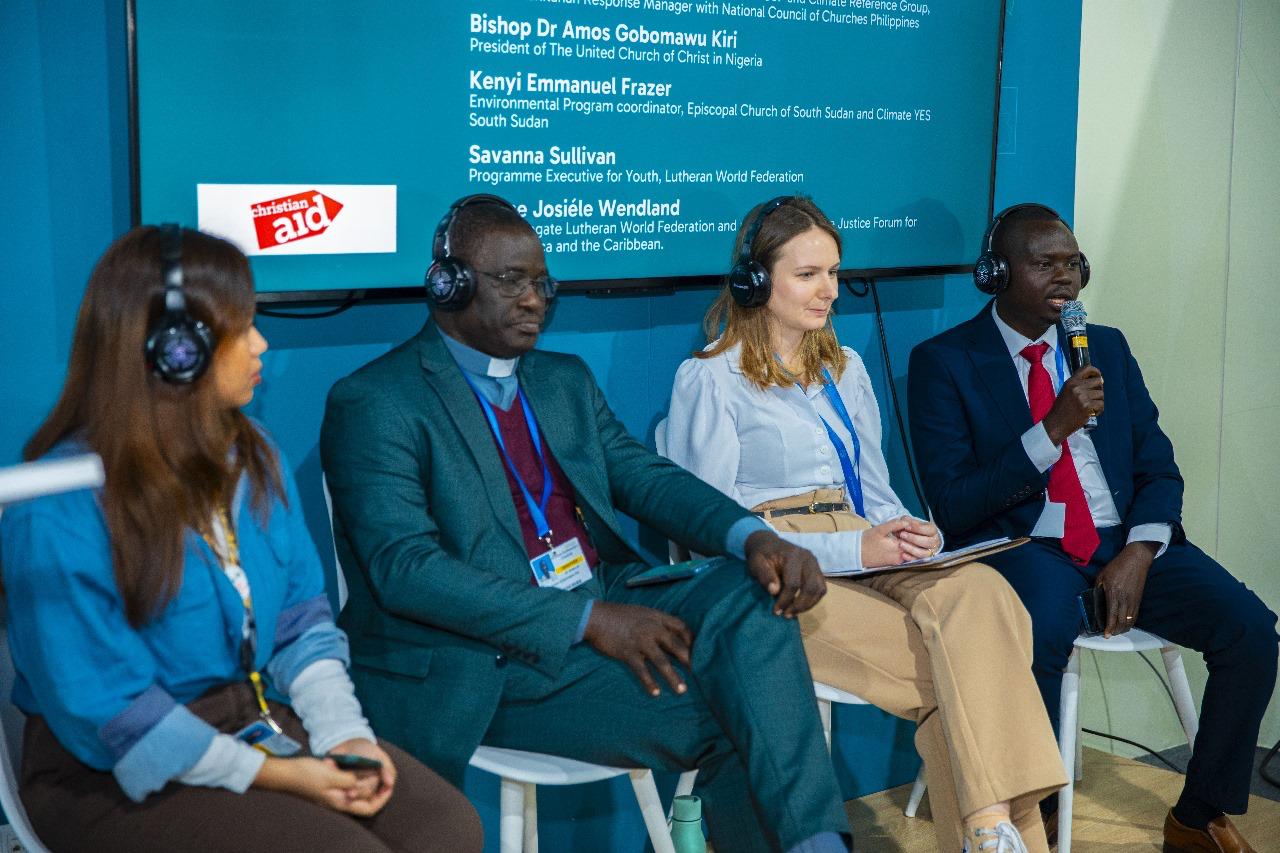تمكين الشباب في العمل المناخي وإستراتيجيات استعادة النظم البيئية .. في جلسات اليوم السابع من جناح الأديان بـ COP29
شَهِدَت فعاليات اليوم السابع من جناح الأديان مجموعة من الجلسات الحواريَّة التي ركَّزت على أهمية التكامل بين القيم الدينية والجهود العلمية للتصدي للتحديات المناخيَّة، وتأثير التغير المناخي على المجتمعات، خصوصًا في المناطق الأكثر عرضة للكوارث مثل المحيط الهادئ والأمازون، كما تناولت النقاشات الإستراتيجيات الوطنيَّة والعالمية لمكافحة الكوارث البيئية، بما في ذلك حرائق الغابات واستعادة النظم البيئية، وضرورة تعزيز دور الشباب في قيادة الحوار والعمل المناخي، مع إبراز رؤية الدين كعاملٍ محفزٍ لبناء أنماط حياة مستدامة وتحقيق العدالة المناخية.
وفي كلمته بالجلسة الافتتاحيَّة للجناح، أشار شون كلارك، محرر وباحث في المجال الديني، إلى أن عام 2024 يُعد الأكثر حرارة في التاريخ، مما يقرِّب العالم من تجاوز ارتفاع درجة حرارة الأرض 1.5 درجة مئوية، وفوق مستويات ما قبل الثورة الصناعيَّة، موضحًا أن تركيزات الغازات الدفيئة لا تزال ترتفع دون توقفٍ، مما يستلزم إعادة النظر في إستراتيجيات مواجهة تغيّر المناخ بشكل عاجل وجاد، كذلك تخصيص جزء من التمويل المناخي لتوعية المجتمعات بالممارسات الإيجابية التي تساهم في إعادة التوازن الكوني واستقرار المناخ.
وفي الجلسة الحوارية الأولى التي عُقِدَت بعنوان: "دور قادة الأديان في بث الأمل للتوصل إلى إجراءات ملموسة لتحديات المناخ"، أكَّد المشاركون أهمية القيم الدينية والأخلاقية في إحداث تغيير حقيقي في الإدراك والوعي المجتمعي تجاه قضايا المناخ؛ حيث استعرضوا تأثير التغير المناخي على المجتمعات في المحيط الهادئ، والعمل المشترك والتعاون بين العائلات والمجالس القروية والدينية لتعزيز العمل المناخي على المستوى المحلي، التي أسهمت في إطلاق مبادرات نوعية مثل أكاديمية شباب العمل المناخي، التي ستكون تحت إشراف صندوق المناخ الأخضر لمساعدة المبادرات الشبابية في الحصول على التمويل الذي تحتاجه في جميع أنحاء المحيط الهادئ.
وفي السِّياق نفسه ناقش المشاركون في الجلسة الحوارية الثانية التي عُقدت تحت عنوان: "الإجراءات التي تقودها البلدان لوقف حرائق الغابات"، الجهود الوطنية لمكافحة هذه الكارثة، من خلال إستراتيجيات شاملة تعتمد على أسس علمية، وإشراك المجتمعات المحلية وأصحاب المصلحة، إلى جانب تطبيق قوانين صارمة للحد من الحرائق الناجمة عن الأنشطة البشرية، وأكدوا أن الظروف المناخية القاسية، مثل فترات الجفاف الطويلة وارتفاع درجات الحرارة، تعد من أبرز العوامل التي تسهم في انتشار حرائق الغابات، التي أصبحت تمثل تحديًا بيئيًّا واقتصاديًّا كبيرًا.
وأكَّدت الجلسة الثالثة التي جاءت بعنوان "استعادة النظم البيئية كآلية للعمل في مجال المناخ ورعاية الطبيعة"، أهمية استعادة النظم البيئية كوسيلة فعالة للتصدي للتغير المناخي والحفاظ على الطبيعة؛ حيث أشار المشاركون إلى أن المبادرات القائمة على الأديان تدعم التواصل بين المجتمعات المحلية والشباب، وتشجع على تطوير برامج تسهم في تعزيز الاستدامة، وتحقيق التوازن البيئي، سواء من خلال مشروعات التشجير، وإحياء الأنهار الجافة، أو مكافحة التصحر، لافتين إلى أنَّ رؤية الإنسانية كعائلة واحدة تعيش في موطن مشترك يمكن أن تكون حافزًا قويًّا لتحقيق التقدم الملموس والجذري في الحوار والعمل المناخي.
واختتمت فعاليات جناح الأديان يومه السابع بجلسة حوارية جاءت بعنوان: "الحوار بين الأجيال: الإيمان في العمل"، تناول خلالها المشاركون قضية دور الأجيال المختلفة في التصدي لأزمة المناخ من منظور الإيمان والعمل الجماعي؛ حيث أشاروا إلى أهمية تمكين الشباب من لعب دور قيادي في النقاشات المتعلقة بالإيمان والكرامة الإنسانية والعدالة المناخية، وكذلك أهمية الأديان كعامل محوري في الاستجابة للأزمة المناخية، لا سيما في الدول الأكثر عرضة للكوارث المناخية.
ويهدف جناح الأديان الذي يستمر خلال الفترة من 12 : 22 نوفمبر الجاري، إلى البناء على النجاح الذي تحقَّق في النسخة الأولى خلال COP28، التي استضافتها دولة الإمارات العربيَّة المتحدة العام الماضي، وحَظِيَ بمشاركة عالمية واسعة واحتفاء دولي كبير، وذلك من خلال تنفيذ مجموعة من الجلسات الحوارية تشمل أكثر من 40 جلسةً نقاشيَّةً وحوارية تركز على ضرورة تعزيز التعاون بين الأديان لرعاية الأرض، وبحث أفضل الممارسات الجيدة للتخطيط للتكيف المستدام من قِبَل الجهات الفاعلة في مجال الإيمان، وكيفية تشجيع أنماط الحياة المستدامة من خلال الدين، فضلًا عن استكشاف التأثيرات غير الاقتصادية لتغير المناخ من خلال وجهات نظر قائمة على الإيمان، وإمكانية الوصول إلى تمويل الخسائر والأضرار، والدعوة إلى آليات المساءلة المحلية والعدالة المناخية الشاملة للجميع.

